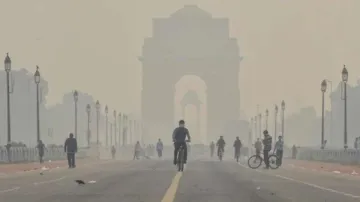In a proactive measure to combat the growing air pollution in the capital, Delhi Chief Minister Atishi announced plans to deploy 10,000 civil defence volunteers across various agencies. These volunteers will be assigned to aid in pollution control initiatives, strengthening Delhi’s ongoing fight against hazardous air quality levels that typically rise in the winter months. The civil defence volunteers will support tasks such as monitoring pollution hotspots, spreading public awareness on pollution control measures, and assisting in enforcing pollution-related regulations.
Atishi on deployment of civil defence volunteers
Addressing a press conference along with Environment Minister Gopal Rai, Chief Minister Atishi said that they will be deployed alongside teams from the Municipal Corporation of Delhi (MCD), the Delhi Pollution Control Committee (DPCC), the Transport Department among others. In a meeting, officials strategised the role of civil defence volunteers and bus marshals across the city to help tackle air pollution, she said.
The Chief Minister said the registration of the 10,000 civil defence volunteers will be done next week, after which, they will be assigned duties for the next four months. The 10,000 civil defence volunteers working as bus marshals were removed in November last year. In a recent Delhi Disaster Management Authority (DDMA) meeting it was decided to deploy them for various anti-pollution measures for four months.
Delhi Environment Minister on pollution
Earlier on October 26, Delhi Environment Minister Gopal Rai emphasised the urgent need to tackle air pollution across northern India, calling the next 15 days "crucial". According to Rai, Punjab has shown a promising downtrend in the stubble burning incidents, with only 1,500 cases reported this year compared to nearly 5,000 cases in 2022. However, he noted an uptick in incidents in Haryana and Uttar Pradesh, which poses a significant risk to regional air quality.
GRAP-II enforced in Delhi-NCR
Last week, restrictions under the second stage of the Graded Response Action Plan (GRAP) came into force in the national capital on October 21 as several areas in the national capital region recorded an Air Quality Index (AQI) of over 300 in 'very poor' category. The Stage-II of the GRAP across the entire National Capital Region (NCR) was invoked from 8 am of October 22. An AQI between zero and 50 is considered 'good', 51 and 100 'satisfactory', 101 and 200 'moderate', 201 and 300 'poor', 301 and 400 'very poor', and 401 and 500 'severe'.
(With inputs from PTI)
ALSO READ: High AQI alert in Delhi NCR: Air pollution raises risk of heart diseases, know signs and ways to prevent

